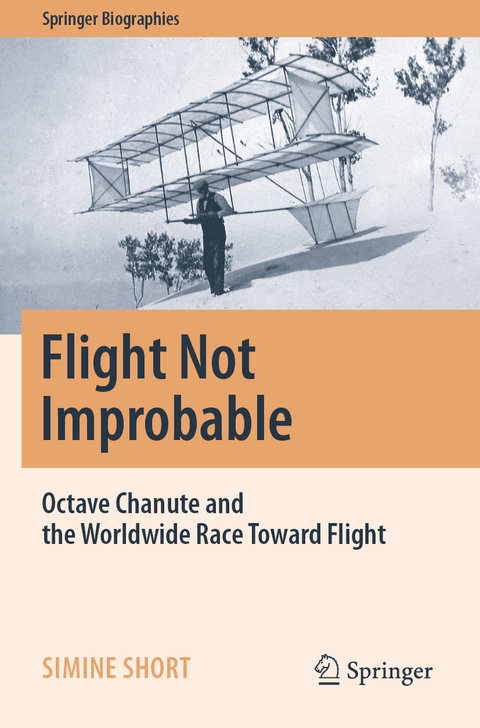
Flight Not Improbable
Springer International Publishing (Verlag)
978-3-031-24432-2 (ISBN)
This book is a must-read for all those interested in the evolution of airplanes.
Its protagonist, Octave Chanute, is best known for his scientific and collaborative approach to the engineering problems related to the development of flight and for the support he gave to the many aeronautical pioneers, including the Wright Brothers. But, as the author clearly demonstrates, this engineer's contributions in the aeronautical field have frequently been underestimated, even though almost every famous and not so famous aeronautical enthusiast contacted him and used the readily available drawings of his glider to build and then learn to fly in their own design. Chanute's biplane glider design, developed and flown first in 1896 in the Indiana Dunes along Lake Michigan, proved to be a key step in the evolution of the flying machine. By freely sharing not only drawings of the general design of this aircraft but also the lessons learned, the biplane became the starting point or prototype for many experimenters and can be considered the foundation for the modern airplane.
This book focuses on Chanute's work in aeronautics. Not having the internet of today, he became the "post-box of early aeronautics," not only because of his landmark book "Progress in Flying Machines" but also because of his strong connections to anyone and everyone who worked in the aeronautical field. He made a point of continuing to learn throughout his own life, and strongly believed in sharing knowledge, while fostering and mentoring all those who were willing to learn.
Simine Short has written more than 150 articles on early aviation, especially on the history of motorless flight as well as a previous book "Locomotive to Aeromotive," published in 2011 by the University of Illinois Press.
The accomplishments of Octave Chanute have intrigued Simine throughout her professional career in science and technology, and she is considered a leading expert on his contributions to, and influence on early aviation. Her new book, "Flight Not Improbable," (Springer, 2023) focuses on how Chanute's input, guidance and encouragement helped many would-be aeronauts achieve their goal to fly successfully and safely.1. How it all began.- 2. Flight is not Improbable (1853 - 1895).- 3. Theory - Investigating - Practical Flying (1896).- 4. Collaboration for Progress in Flying Machines (1898-1902).- 5. Two Eventful Years of Intertwined Development (1903-1904).- 6. The Persistent Experiments to Wing the Air (1905-1907).- 7. Internationalism, Idealism and Materialism (1908).- 8. New People, new Designs, new Ideas, new Problems.- 9. How Soon Can We All Fly? (1910).- 10. Some Final Words.
| Erscheinungsdatum | 25.05.2024 |
|---|---|
| Reihe/Serie | Springer Biographies |
| Zusatzinfo | XXVI, 443 p. 145 illus., 20 illus. in color. |
| Verlagsort | Cham |
| Sprache | englisch |
| Maße | 155 x 235 mm |
| Themenwelt | Technik ► Luft- / Raumfahrttechnik |
| Schlagworte | aviation history • Chanute Biplane • Chanute glider • Early aviation development • knowledge sharing • Motorless flight • Teamwork and collaboration for success • Technology cooperation |
| ISBN-10 | 3-031-24432-X / 303124432X |
| ISBN-13 | 978-3-031-24432-2 / 9783031244322 |
| Zustand | Neuware |
| Informationen gemäß Produktsicherheitsverordnung (GPSR) | |
| Haben Sie eine Frage zum Produkt? |
aus dem Bereich


![OFFIZIELL GELEUGNET! [Das Buch zur Netflix-Sensation UNACKNOWLEDGED] - Steven M. Greer; Steve Alten](/media/84769341)